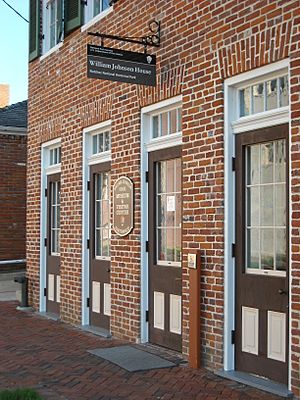William Johnson (barber) facts for kids
William T. Johnson (born 1809 – died June 17, 1851) was a free African American barber who lived in Natchez, Mississippi. He was known for being a successful businessman and for keeping a detailed diary that gives us a look into life in the 1800s.
Contents
Early Life and Freedom
William T. Johnson was born into slavery. However, his owner, who was also named William Johnson and was thought to be his father, set him free in 1820. His mother, Amy, had been freed earlier in 1814, and his sister Adelia in 1818.
Young William trained to be a barber with his brother-in-law, James Miller. He started his work in Port Gibson, Mississippi. Later, he returned to Natchez, where he became a very successful business owner.
A Successful Businessman
In Natchez, William Johnson built a thriving business. He owned a barbershop, a bath house, and even a bookstore. He also owned land. He was so successful that he loaned money to many people, including the governor of Mississippi. This was the same governor who had signed the papers to make him a free man.
In 1835, William married Ann Battle, a free woman of color. They had eleven children together. It is important to know that even though William had been enslaved himself, he later owned sixteen enslaved people. This was a common but complex part of life in that time period.
The Important Diary
William Johnson started writing a diary in 1835 and continued it for the rest of his life. This diary was found again in 1938 and published in 1951. It is very important because it tells us a lot about what daily life was like for a businessman in Mississippi in the 1800s. It also shows that he himself became a slaveholder. His writings are now kept at Louisiana State University.
His Tragic Death
In 1851, William Johnson was killed by a neighbor named Baylor Winn. This happened after a disagreement about land boundaries. William was a respected businessman, and many people were upset about his death.
Winn was held in prison and had two trials. However, because of the laws at the time, black witnesses were not allowed to speak against white people in court. Winn claimed he was part white and part Native American, which meant he was considered white by law. Because of this, the black witnesses to the event could not testify, and Winn was not found guilty.
William Johnson's Legacy
In 1990, the United States Congress passed a law to make William Johnson's home a part of the Natchez National Historical Park. This helps to preserve his story and teach people about his life and times.
 | Anna J. Cooper |
 | Mary McLeod Bethune |
 | Lillie Mae Bradford |


